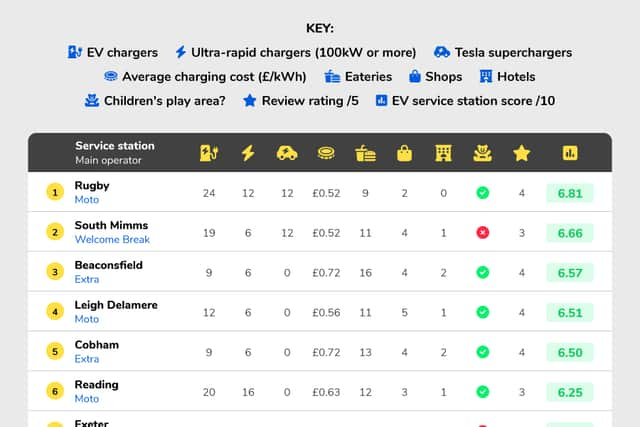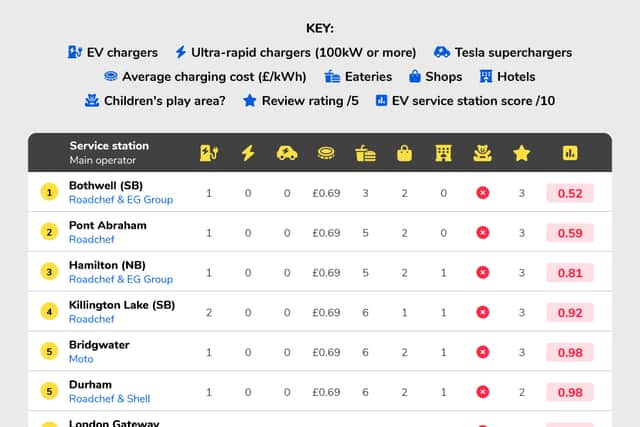UK's best motorway services for electric cars: EV charging provision, costs and facilities rated by new study
and live on Freeview channel 276
The best motorway service stations for electric car drivers have been named in a new study of the country’s motorway infrastructure.
As the number of EVs on the roads rises rapidly and amid fears that not all locations are keeping up with demand, the study also named the worst places for EV owners to have to stop, based on a number of factors.
Advertisement
Hide AdAdvertisement
Hide AdThe research by EV resource DriveElectric looked at the number of EV chargers at each location as well as the average charging cost, visitor reviews and the provision of food and shopping facilities in order to come up with a score out of 10 for each site.
Rugby services on the M6 emerged as the number one stop for EV drivers thanks to its huge number of chargers, relatively low charging costs and good facilities. With 24 ultra-rapid chargers, Rugby has the second most devices of any service station, although half of them are Tesla-only Supercharger units. The average cost of charging was 52p per kWh, less than the average public charging cost, which stands at 61p, according to Zap-Map’s price index.
The stop was also rated highly for its food and shopping options and for its children’s play area and grassy outdoor space, earning an overall rating of 6.81 out of 10.
Just behind it, with a score of 6.66, was South Mimms on the M25. The Welcome Break facility has 19 chargers in total, including six ultra-rapid units and 12 Tesla Superchargers. It also averaged 52p per kWh and had 11 food and shopping outlets for drivers to refuel while their car recharges.
Advertisement
Hide AdAdvertisement
Hide AdBeaconsfield services on the M40 rounded out the top three. With nine chargers, six of which are ultra-rapid, it has among the lowest number of devices in the top 10 and is also one of the most expensive, with an average cost of 72p/kWh. However, it scored highly among user reviews and, with 16 food outlets plus four other stores, scored well for its facilities.


The study discounted any service station that had no EV charging provision before identifying the worst locations to stop. Top of that list was Bothwell (southbound) on the M74, which scored a meagre 0.52 out of 10. The Roadchef site has just one charger, rated at 50kW and costing 69p/kWh. It was also criticised for a lack of facilities, with just two shops and no children’s play area.
It was a similar story at Pont Abraham on the M40, which scored a lowly 0.59, putting it second on the list of shame. It also has a lone charger, costing 69p/kWh, and just three food options, including a Starbucks On the Go coffee machine.


Also failing to scrape even one out of 10 was Hamilton services. Suggesting that EV drivers in Scotland are particularly poorly served, this is the second station on the M74 in the bottom 10 and one of five Scottish sites on the list. Like Bothwell and Pont Abraham, Hamilton has just one charger, costing 69p/kWh, just five foot outlets and two shops.
Advertisement
Hide AdAdvertisement
Hide AdThe UK government wants there to be at least six high-speed chargers at every service station in England by the end of 2023 but recent research suggests provision is lagging behind this ambition. Just 27 out of 199 already meet that target and six have none at all.
Issues including planning permissions and power supply are believed to be behind some of the delay in charger roll-out. Earlie in June Gridserve announced that it would use vegetable oil-powered generators and second-life EV batteries to run chargers at Ferrybridge while it waited for grid connection problems to be fixed. And in February, National Highways revealed an £8 million plan to use battery stacks stored in shipping containers to help power ultrar-rapid chargers at some locations where power supply is a problem.
Comment Guidelines
National World encourages reader discussion on our stories. User feedback, insights and back-and-forth exchanges add a rich layer of context to reporting. Please review our Community Guidelines before commenting.
